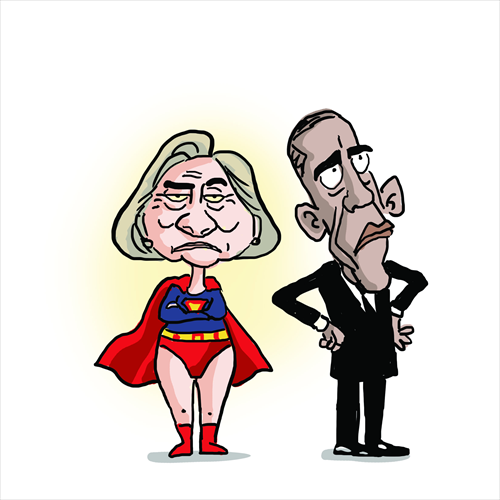Clinton-Obama debate reveals policy divide

Illustration: Liu Rui/GT
In a long interview with the Atlantic, former secretary of state Hillary Clinton criticized President Barack Obama. Specifically, she declared that had the US provided arms to the original democratic opponents of the Bashar al-Assad regime in Syria, the situation there would be different, and that the Muslim fundamentalists with their fanatic violence might not have arisen to fill a vacuum.
Clinton used conditional language, to give the impression of a rather hypothetical reflection, but no one accepts this fiction. Her words were immediately and unanimously taken as an expression of her formally undeclared but entirely obvious campaign for the presidency. They were a declaration of distance from an unpopular president often criticized as an intellectual lacking the will to defend the nation's interests.
The president struck back, expressing extreme skepticism that the democratic opposition in Syria could have successfully opposed the military capacity of the Assad regime. The president was mordantly critical of the charge that US irresolution had provided an opening for the jihadists in Iraq.
The direct renunciation of the policy Clinton supported as secretary of state was not, however, the most striking aspect of the interview. It was a systematic statement of the US nationalism embodied in the claim to global hegemony, disguised as moral and political leadership.
Clinton did not hesitate to defend what she referred to as the "ugly" aspects of the Cold War, but did not name the nations in which the US had intervened, frequently to uphold or install brutal regimes which were reliably anti-communist.
She ignored equally covert interference in democratic nations. In the end, she proclaimed, the Cold War was won, legitimizing what was done to win it. She sounded as hard as Henry Kissinger, but gave no evidence of having his historical intelligence.
That the end of the Cold War did not initiate a universal reign of peace and prosperity was attributed by Clinton to the irredeemable nature of nations and peoples unfortunate enough not to share in the destiny of the US.
Clinton singled out Vladimir Putin and Russia as especially flawed, pronounced Israel morally and politically exemplary, and was patronizing of Europe, skeptical of the possibility of agreement with Iran and remarkably silent on Asia - except for praise for Japanese Prime Minister Shinzo Abe for efforts to increase the share of women in the Japanese work force.
One might have thought Abe's deference to Japanese nationalism would be of some interest to her. After all, she is not the first graduate of Wellesley College in the vicinity of Boston to be interested in world politics. She was preceded by Madame Chiang Kai-shek.
President Obama, in recent statements like the interview with Thomas Friedman in The New York Times, has taken a very different approach. He explicitly rejects the view that the US, however large its potential for influence, can impose its views on the world.
He insists that there are many problems which do not respond to military solutions. Nations and peoples bear responsibility for overcoming their own divisions. The US has quite enough to do within its own borders, and indeed failing to solve its own problems would become its own greatest adversary.
His words are devoid of the triumphalism of Clinton's unoriginal version of American exceptionalism. No president since John F. Kennedy - in the 1963 speech calling for an end to the Cold War - has so emphatically defied the conventional thought of the US foreign policy elite, which accounts for their relentless denigration of the remarkably intelligent president.
Obama has indeed made some of the worst traditions of the foreign policy apparatus and the domestic security state, especially in surveillance of the citizenry in violation of constitutional rights, and covert operations abroad forbidden by our own laws and international law.
Clinton's views are a sophisticated return to the dogmatism that made her as a schoolgirl an enthusiast for the angry provincialism of the prophet of contemporary Republican imperialism, Senator Barry Goldwater.
The erstwhile student critic of the Vietnam disaster is placing herself at the head of a shallowly modernized war party. Obviously, she thinks that the anti-imperial Democrats in the Obama coalition will have no choice but to vote for her, while she mobilizes the millions who sullenly leave decisions on war and peace to those who think of themselves as their betters.
She may be living in a time warp. The anti-war voters might simply stay at home, or enough of them could support a third party candidate to give the presidency to the Republican candidate. The Republicans themselves might turn away from perpetual warfare.
Clinton mistakenly thinks that the conditions of the past half century, in which the US did exercise hegemony over much of the world, will continue indefinitely. That is not the case. Obama, much younger, has a far more realistic view of past, present and future.
Their debate will continue, well after each leaves the political stage. It is, after all, the debate that will shape much of US politics for the next half century.
The author is professor emeritus of Georgetown University Law Center. opinion@globaltimes.com.cn